#kokyuu
Explore tagged Tumblr posts
Text
Kokyuu just dropped... definitely one of the best MyGO!!!!! songs ever I think

7 notes
·
View notes
Text

Copernicus no Kokyuu, Nakamura Asumiko
42 notes
·
View notes
Text


i read this yesterday
#asumiko nakamura#copernicus no kokyuu#very shojoesque experience#very cruel god reigns adjacent work#<- better than sakuragari tho
32 notes
·
View notes
Text
My Top 15 Favourite Anime (& Donghua) Female Characters 2024
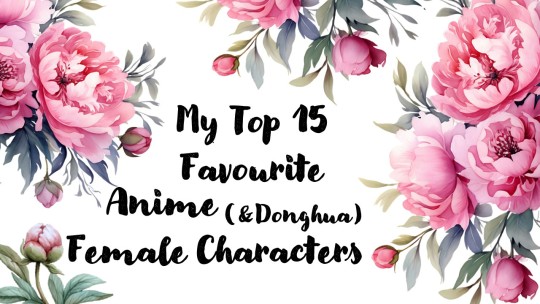
[Before I get started, I'd like to point out that making this list was quite challenging considering I have watched quite a few anime. So please don't be too offended if any of your favourites aren't included; just because they aren't here doesn't automatically mean I dislike them. Feel free to leave your constructive thoughts and own lists in the comment section since I appreciate amicable discourse. Also, I decided to use the "keep reading" feature to make it easier to scroll through the long posts on my blog, so the official list is under the cut.]
-> Honourable Mentions:
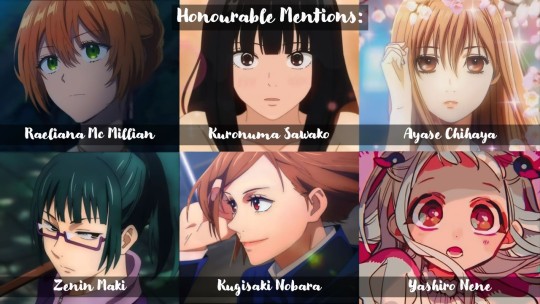
-> My Top 15:
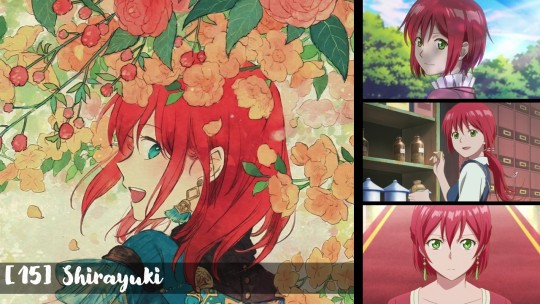
“If you’re helping someone and expecting something in return, you’re doing business not kindness.” Shirayuki is incredibly empathetic and emotionally aware as evidenced by her drive to ensure that the people around her feel cared for and supported. Even if it involves sacrificing her time and energy, she is always eager to help others. At times this is her greatest strength—as it enables her to build strong connections with others. However, on occasion, this trait makes it difficult for her to establish boundaries and prioritise her own needs. This struggle is something I think we can all relate to. I greatly admire her determination, optimism, compassion and resourcefulness. Her integrity, patience and consideration for others is something I aspire to emulate in daily life. Her passion for plants is something I have in common with her.
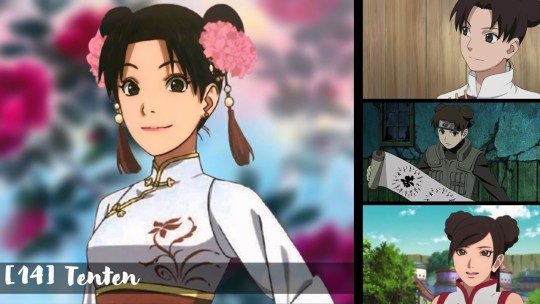
"I won't lose to myself!" Given that she has become somewhat of a meme in the fandom, I'm sure some of you may be surprised by this, but she was one of the first female anime characters I resonated with when I was young. Although she lacks presence in the overall series, her strong-willed and independent yet easy-going and relatable personality endeared her to me. Even in stressful situations, she is renowned for her diligence, discipline, practicality, and reliability. Her character serves as a tribute to the resilience of the human spirit as well as the value of perseverance and hard work. Her fear of failure sometimes causes her to doubt herself and her capabilities which highlights the struggle we all face with balancing our concerns and our obligations. Her fighting style and character design remain one of my absolute favourites, making me annoyed that Kishimoto didn’t do more with her character. Also, nejiten is my Roman Empire.
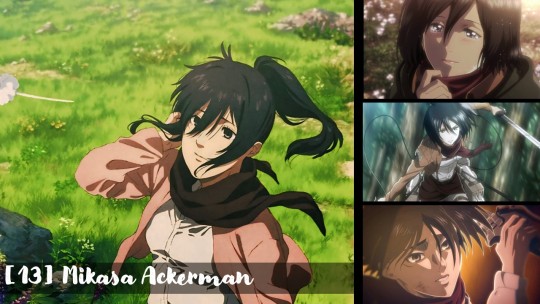
“This is a cruel world. And yet...so beautiful....” In all honesty, I'm still miffed by the ending of Attack on Titan, which had me contemplating whether to include her on this list, but I realised that would be petty and short-sighted. Mikasa was one of the first female characters I saw who not only stood with male characters on the battlefield but also outperformed them—which made me look up to her. Mikasa's greatest attributes are her inner strength and innate sense of responsibility to defend her loved ones and fight for justice, as well as her intense loyalty and devotion, especially to Eren. Aside from her strength and fortitude, she also possesses compassion and gentleness towards those she cares for—which I admire considering many female characters in shounen anime are pressured to sacrifice these qualities to be strong and respected.
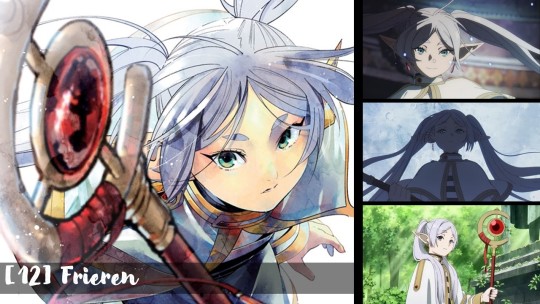
“Why didn’t I try to get to know him better?” Since Frieren is the newest character on this list, I’m sure she’ll continue to grow on me in due time. As the protagonist of a show centred around the value of life, the importance of goodbyes and the passage of time; Frieren is an incredibly complex, multi-faceted character. Her journey to understand the depth of human relationships and emotions—after losing someone she failed to realise was important to her—is an incredibly touching and insightful one. Watching her experiences serves as an important lesson: to value every moment and to take the initiative to build connections with others—which is something I often struggle with. Frieren is best recognised for her composed demeanour. She demonstrates qualities such as an affinity for independence, a keen sense of introspection and a preference for logical reasoning—all of which allow her to serve as a voice of reason for their group. Her sharp mind and unrelenting curiosity propel her to continually expand the limits of her knowledge, enabling her to innovatively tackle challenges from a unique viewpoint—making her an engaging and dynamic character to watch.
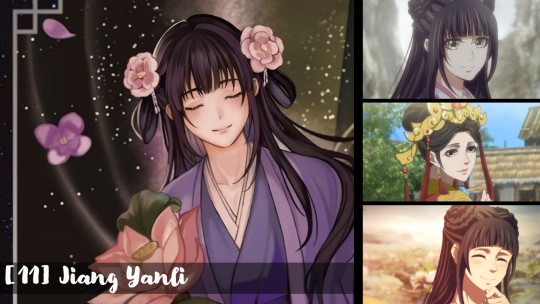
“A-xian is my little brother…When others insult him it is no small matter to me.” While often overlooked due to her immense kindness and amiable personality—her determination, selflessness and fierce protectiveness of her loved ones are admirable. Although not a major character in MDZS, her influence over its more central characters is evident. Her lack of hesitance in sacrificing her life for her martial brother, Wei Wuxian—even though he unintentionally contributed to her husband’s death—endeared me to her. Her determination to rise above her difficult upbringing and grow into a caring, mature and reliable figure is praiseworthy along with her capacity to find common ground in seemingly immutable situations. Her character design ranks among my favourites as well and complements her personality well. She taught me that despite being in a society where one is harshly rebuked or pressurised it is important to stand firm in your beliefs and desires.
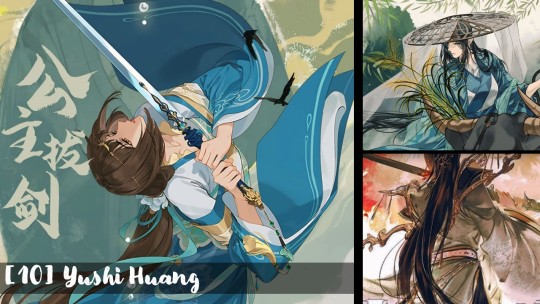
“If you must cling to something in order to yield, why not pick up that which you have tossed away and hold it in your hands anew?” While initially, she doesn't appear to be very noteworthy because of her limited role in the series, the brief time she gets presents her in a positive light and her backstory is notably well-developed even among more prominent side characters. Despite her reclusiveness; her compassion, forgiveness and humility are noteworthy—especially when contrasted with the majority of other Heavenly Officials. Given that characters like Xie Lian and Hua Cheng respect her, while Jun Wu and Pei Ming are cautious of her proves that her strength and significance should not be undervalued. Her ascension story—which earned her the moniker “The Princess Who Slit Her Throat”—is a prime example of her incredible selflessness as she willingly laid down her life to protect her family and country despite being ignored and mistreated for most of her life. She remains very grounded despite her status as the God of Rain and Agriculture and is always willing to help others, even if it means defying authority. She possesses no ill will towards those she has had disagreements with and doesn't hesitate to save them.

"Even if it's a short life, burn hot and bright and overtake the moment. That's my way of life." Kagura is best known for her quick wit, tomboyish personality and fighting spirit which often manages to steal the spotlight in the Gintama series. She is an ardent and fierce fighter who doesn't hesitate to express her opinions. Beneath her brash exterior, she is compassionate and caring, frequently using her keen intuition and empathy when interacting with others. She often takes risks, facing challenges directly which can be seen as impulsive and abrasive—however, this behaviour stems from her need for control and security amidst a chaotic world. In a sense, we all struggle to assert ourselves in difficult situations and could benefit from approaching things with a little more of Kagura's zeal. Kagura also enjoys helping others and is incredibly devoted to the people she loves. She is also not afraid to voice her opinions or act when she sees someone in need. By virtue of her strength, humour, and charm, she has not only gained popularity among fans but also established herself as an iconic figure in the shounen genre.
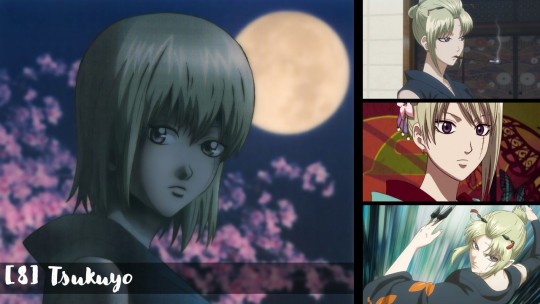
"If you don't hold a rose carefully, you'll get pierced by its thorns." Tsukuyo is best known for her unique fighting style, sharp wit, caustic humour, and compelling backstory which has allowed her to become a fan favourite and a key part of many serious arcs in the series. In many respects, her design and backstory serve as a parallel to that of the protagonist—Gintoki—which adds to her depth. Furthermore, her name and personality are based on Tsukuyomi no Mikoto—the moon god in Shinto and Japanese mythology—accentuating the cool aesthetic of her design. Contrasting her rough exterior, Tsukuyo is shown to have a tender side, exhibiting an innate sense of empathy and sensitivity. Although her reserved attitude often conveys an impression of aloofness and distance, this is just how she processes things and expresses concern, which is something I can identify with. Her most admirable quality is her strong sense of duty and loyalty towards her loved ones, as well as her inclination to prioritise the needs of others over her own. Although she struggles with insecurity and anxiety—leading her to hesitate and over-analyse—she is resolute in overcoming these issues when crucial matters are at stake, which is a valuable message.
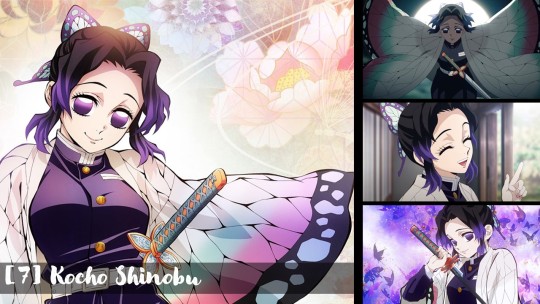
“I once believed that the road of happiness continued forever and ever into the distance. When it was destroyed, I realized for the first time that it lies upon a thin sheet of glass. And just as we were saved, there were those whose happiness that haven't yet been destroyed. So, I wanted to get stronger and protect them.” Shinobu is a multifaceted and captivating character who stands out—even amongst Demon Slayer's eclectic cast—largely due to her distinct fighting style, striking design, tragic backstory as well as her nuanced personality and motivations. Shinobu's strongest assets are her insight, and compassion, which enable her to support those in need. She usually has a relaxed smile on her face and generally exhibits a bright, amiable, and joyful demeanour. However, it soon becomes apparent that this outward disposition is a façade masking her profound anger and relentless desire for vengeance. This dichotomy in her persona is foreshadowed by her conflicting roles in the series as a healer and a poisoner. Her desire to cater to those close to her is the primary motivation for her outward façade, which is primarily modelled after the mannerisms of her deceased older sister. Considering we all conceal certain parts of ourselves to appeal to others, this aspect of her character is very impactful and relatable. She also often struggles with feelings of inadequacy stemming from her physical limitations. However, she overcomes this obstacle by employing poison to kill demons, showcasing her resourcefulness, fortitude and tenacity. Although we all feel envious of the talents of others, Shinobu's character is a reminder that we all have our strengths and should face obstacles head-on never giving up on our objectives.
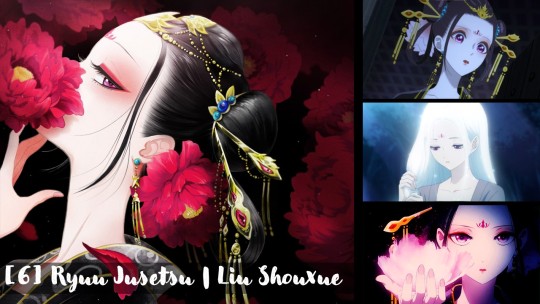
“Although our thoughts are changeable and difficult to understand, the actions we take don’t change, no matter how much time passes.” As a consequence of her seclusion in the Yamei Palace and her mystical abilities, Jusetsu is quite enigmatic and detached. While she is often perceived as haughty and aloof due to her bluntness, impatience and lack of social experience; she is shown to have a tender and vulnerable side. She possesses an inherent sense of justice and doesn't disregard those in need, even if they have offended her in the past, which is incredibly admirable. Although her position as the Raven Consort demands her to live alone, she quickly finds herself surrounded by people, leading her to feel guilty considering her deceased predecessor remained isolated. Her heart begins to soften as she lets others in, but she often struggles to comprehend others, causing her to inadvertently offend them—which is something that most of us can relate to. However, she is quick to mend things once she realises her misstep and comes to learn that it's necessary to confide in those who care about you. She frequently exhibits guilt about seeing her mother die, which leads her to feel that it's preferable to be by herself than to lose anyone else. Her struggles with guilt and constant introspection not only add to her complexity as a character but also make her very relatable. To a degree, we all worry that opening our hearts to others will result in us being irrevocably hurt but constantly have to take that risk to live a fulfilling life—thus making Jusetsu’s journey an incredibly empowering and compelling one.

“I'll definitely overtake you, and it'll be my turn to worry about you.” Misaki is best described as bright, diligent, pragmatic, and disciplined. As the student council president, she is committed to improving her school's reputation, even if it involves challenging the expectations of her male teachers and peers. Before Misaki's father abandoned their family, she was noticeably more tender-hearted and compassionate, but she subsequently developed a bias against males based on her conviction that they were inconsiderate and unreliable. She possesses a rigid sense of justice and sets high standards for herself and everyone around her. Consequently, she often struggles with her emotions, particularly when it comes to maintaining her composure when her private life is disrupted. Misaki is particularly embarrassed about her part-time position at a Maid Cafe, believing it contradicts her strong, uncompromising image, and consequently takes great effort to establish a rigid boundary between her public image and her private life by keeping this job hidden from others. Misaki's best quality is that she never veers off course and gives her all in everything she does, inspiring others in the process. Misaki exemplifies the value of resilience and diligence when it comes to achieving one's goals because, despite facing countless hurdles, she remains committed to her ideals. Conversely, she is overly self-sacrificing and frequently overworks herself due to her inability to trust others. Through the course of the series, she learns to accept her femininity and fragility while remaining assertive and self-sufficient. As she navigates her growing romantic feelings for Usui, she learns the value of having faith in others, as well as the significance of respect, communication, and acceptance in relationships. This process of self-discovery moulds Misaki into a multifaceted character who is exemplary and relatable.
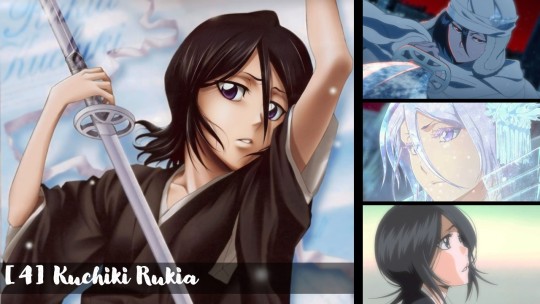
“If history repeats itself, and moves in a circular path, then believing that whatever force is turning it is perfect, is all we can do as we move ahead. Pushed along by forces beyond our control, waiting, for the blade to be swung." Rukia’s best attributes are her altruism, modesty, strong moral compass and sense of duty. Her journey throughout the series centres around self-acceptance and belonging. Initially, she feels worthless and out of place yet longs to be recognised and accepted. Given that she finds it difficult to reach out to others, she never expresses these desires and lives a lonely life under continual strain. After meeting Ichigo and his friends, in the World of the Living, she begins to open up but quickly backtracks after she is taken back to the Soul Society to be executed. Despite enduring tremendous hardship, she never forsakes her ideals or blames anybody else—but instead faces and overcomes everything alone. This demonstrates her immense fortitude, resolve and integrity. Her strength lies in the fact that her heart never fluctuates. Upon the moment of her execution, she does not display fear or regret but is instead grateful for having lived an ample life. However, this is the turning point, as she is saved by Ichigo and is thereafter rewarded for her resolve and steadfast convictions. She finally alleviates herself of the guilt and grief she had been carrying by allowing herself to rely on others for emotional support. She can now confidently confront and overcome her greatest challenges because she is certain of who she is. In this way, Rukia's character serves as an example that no matter what you are faced with, your efforts will be recognised so long as you remain resolute and virtuous—which is incredibly commendable and compelling.
Her enduring and incomparable bond with the series’ protagonist, Ichigo is one of my favourite aspects of her character and the series as a whole. Throughout the story, she is a continual source of both physical and emotional strength for him. In several respects, Rukia's character is a parallel to his as she understands Ichigo's feelings better than anyone else considering she has gone through similar experiences. The quote "The rain drags the Black Sun down, but the rain is dried by the White Moon" perfectly encapsulates their dynamic—with Ichigo representing the former and Rukia representing the latter. Throughout the series, the rain is a potent metaphor for Ichigo's despair, while Rukia is constantly seen guiding and consoling him—effectively drying up “the rain”. She acts as a "ray of light" for Ichigo—despite her problems—who in turn does the same for her. Rukia's symbolism as the "White Moon" also pertains to her technique—specifically her bankai, which transforms her into a veritable ice princess. This symbolism furthers her development, influence and prominence in the series.
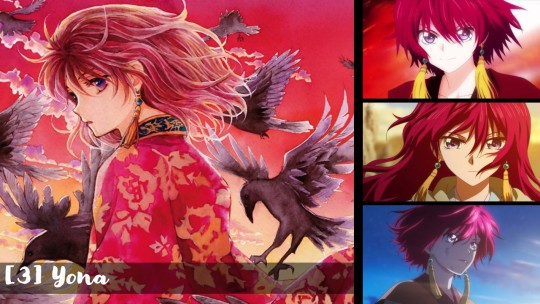
"Before I question the gods, there are questions I should ask myself!" Yona's remarkable development from a pampered princess to a courageous warrior is precisely why she is one of the most recognised and respected shoujo heroines of all time. This development begins after her privileged and idyllic life in Hiryuu castle is upended when her beloved cousin, Soo-won, murders her father and seizes the throne. After witnessing this traumatising event, she is forced to flee the castle and is forced to adjust to a harsh and perilous life on the run. She is momentarily overcome with fear and denial thus depending entirely on her bodyguard and childhood friend Hak for protection and care. However, after recognising that the people who were sheltering her would suffer as a result of her incapacity, she began to pull herself together. Empowered by her newfound resolve, she and Hak journey across the kingdom in search of the legendary Dragon Warriors and through these fateful encounters, they cultivate a revitalized sense of purpose and camaraderie. It is on this journey that she begins to realise that her father’s pacifistic reign came at the cost of weakening their kingdom, leading to widespread strife and corruption. Her overwhelming guilt regarding her ignorance causes her to develop a genuine sense of responsibility towards her nation's people. With the support of her allies, she travels around the kingdom to improve the lives of the common people, having abandoned the prospect of revenge. Yona's fundamental strength is shown to derive from her emotional fortitude, compassion and capacity for forgiveness. Additionally, her adaptability, willingness to learn, and strong sense of conviction are all admirable. Although she continues to grow stronger throughout the series, she has always been incredibly kind and compassionate. She is inspiring because she demonstrates that true strength comes from within. It is her immense compassion that not only motivates her to protect her nation and change the lives of those around her but also draws people like Hak and the four dragon warriors to her. Her ability to forego her desire for vengeance in favour of forgiveness is not a show of weakness but is one of strength, selflessness and maturity. She realises that her desire for revenge is outweighed by the kingdom’s need for a radical and strong ruler like Soo-won —leading her to choose to work from the shadows to uplift the common people.
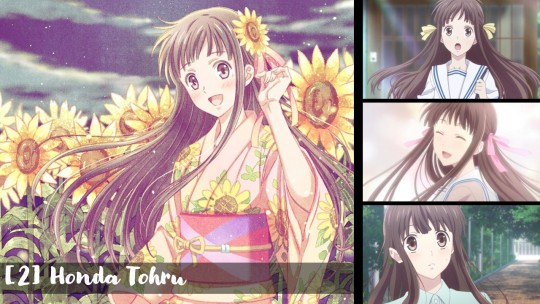
“It’s not always easy to see the good in people. In some people, you might even doubt that it’s there at all. But if you can somehow, find a way to believe…sometimes that’s all it takes to help someone, to give them the strength to find the good in themselves...” “No matter how cold it is now, spring will come again...” Tohru is best described as optimistic, hard-working, patient and open-minded. She is also modest, caring, and gentle-spirited. She constantly strives to seek out the good in everyone she encounters and is always willing to assist those in need—bearing no resentment against those who have harmed her. Her benevolent and amiable disposition effortlessly attracts people to her, making them feel accepted and valued, as demonstrated through her interactions with the zodiac members of the Sohma family. In comparison to the series' vast ensemble of colourful, quirky characters, Tohru is frequently perceived as being too perfectly kind and hence bland—nonetheless, this is completely misguided. In actuality, Tohru is equally as emotionally broken and thus the Sohma family heals her heart in the same way that she heals theirs. Her character is an exemplary subversion of the typical "kind-hearted" heroine given that she faces several genuine hardships that result from her gentle and charitable nature. She is not a perfect saint, but rather a girl who prioritises the struggles of others over her own as she attempts to find her place in the world. Her greatest strengths are her immense compassion, innate empathy and sincerity. Given that she expects nothing in exchange for helping others, her generosity does not originate from a position of entitlement, which is incredibly admirable. Tohru has a strong desire to be needed by others and thus often puts the needs of others before her own. She craves validation and assurance, hoping to be acknowledged as essential and irreplaceable to those around her. In response to the terrible treatment she received from her paternal relatives, Tohru has developed the notion that she might burden those around her, so she rarely expresses her desires. Consequently, she is inclined to internalise any unpleasant emotions and feelings rather than express them externally. However, as time passes, Tohru gradually learns to be more assertive and to accept help from others. Tohru's relationship with Kyo is another facet of her personality that I find endearing. Despite having similar backstories, they have developed divergent perspectives on life. Kyo finds it hard to recognise the positive in other people, while Tohru finds it hard to perceive anything negative in them. They strike a perfect equilibrium as he teaches her that being too unselfish and not sufficiently assertive is detrimental to her well-being, while she helps him realise that there is hope in trusting others. While Kyo is not the only one who sees through Tohru's façade, he is one of the only individuals who can help her face her issues as she becomes especially transparent around Kyo, confessing all her concerns and anxieties to him. Tohru demonstrates the power of forgiveness, love and friendship and exemplifies what it means to be a good person. Her journey towards overcoming her fears and attaining true happiness through strength and determination is heartwarming and inspiring. She embodies hope and compassion in a cruel and unfair world. Her growth demonstrates that being kind is not synonymous with being powerless or meek. She demonstrates that no one is completely perfect—that kindness is a choice rather than an innate gift, therefore we are all capable of making the effort to be kind and compassionate to others.
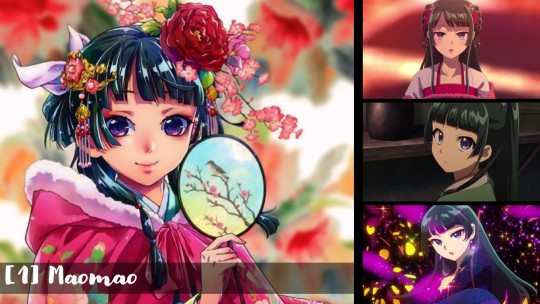
“If I should die, I'd want to die of poison.” Maomao's story is kickstarted when she is kidnapped and sent to the Imperial Palace as a maidservant. Maomao’s extensive knowledge of poisons and medicine, along with her aptitude for unravelling mysteries ensnare her into the intricate web of political intrigue despite her attempts to remain inconspicuous. She is mature, sharp-witted, composed, and pragmatic, in large part because she grasps her expendability in the Rear Palace. Being raised in the Red-Light District has shaped her into a resilient and adaptive person with a thorough awareness of society's complexities, which she uses to traverse the Rear Palace. Consequently, she has developed a highly practical and pessimistic mindset on life, centred around avoiding trouble and adjusting to her surroundings—which has enabled her to tolerate circumstances that many would deem traumatic or distressing. Ironically, her insatiable curiosity, along with her strong sense of justice and empathy, frequently counterbalances her self-reservation; leading her to become involved in problems that affect others. Maomao is intrigued by poisons and medicinal plants, and she often investigates their effects on her own body. This passion is her primary motivation for her actions considering the mere prospect of savouring poison or studying a rare medicinal component kindles a fervent fire within her, resulting in a riveting shift in demeanour—which is naturally perceived as astonishing and insane by many characters, particularly the series' deuteragonist, Jinshi. Maomao’s name is derived from the onomatopoeia of a cat’s meow “貓” and fittingly she is often depicted with cat ears, which act as a visual metaphor for her ardent curiosity. This feline motif, combined with her proclivity for pushing herself into risky situations and her dangerous fascination with poisons, makes her the epitome of the phrase "curiosity killed the cat". Despite her exceptional competence and charisma, Maomao is not flawless; in fact, her flaws add to her appeal. Although Maomao's distrustful and inquisitive nature makes her an excellent detective, this same quality—coupled with her distorted yet starkly reliable perception of human connections—occasionally renders her socially inept. Maomao tends to shy away from forging strong, intimate bonds or attachments with other people, causing her to be wilfully oblivious of the obvious concern or affection others have for her, regardless of whether it is in a platonic, romantic, or professional capacity. Furthermore, she is sceptical about the notion of romance, feeling that it is more likely to cause ruination than to provide happiness. This scepticism and detachment are probably traumatic responses to being brought up in the red-light district, where someone's genuine affection alone does not guarantee that they will not discard you if needed.
Another aspect of Maomao’s character that I find intriguing is her dynamic with Jinshi which develops gradually and is multi-faceted due to their opposing traits, social statuses, and backgrounds. Despite her pretence of indifference, Maomao's actions—specifically her attentiveness and concern—gradually disclose her growing interest in him. Maomao's development demonstrates her progressively becoming less closed off emotionally as she processes the intricacies of her feelings. Similarly, Jinshi had no intention of growing attached to her—as he merely wanted to capitalise on her skill set and intellect. Nevertheless, he fell for her fairly quickly, with his feelings progressing from possessive attachment to ardent, selfless love. Their partnership is defined by mutual respect, trust, and their resolve to overcome obstacles of the aristocracy together. The series’ willingness to address feminist themes within a historically misogynistic setting adds another layer of complexity to Maomao’s character; since her intellect, competence, independence and boldness defy the gender expectations of the era. Even amidst the competitiveness of the Red-light district and the complex balance of power within the imperial harem— which were settings devised to pit women against one another—Maomao continues to advocate for camaraderie between women. As we continue to witness women supporting and empowering each other; their enduring strength and tenacity is exemplified. Maomao's journey is thus an embodiment of progressiveness reflecting a refreshing standpoint on female empowerment. Maomao's exceptional charm and vibrancy are profoundly compelling, instilling an enduring sense of inspiration and empowerment.

[Congratulations and thank you if you made it all the way to the end. I fear I rambled too much…. oh well… If anyone has any suggestions on what to do next, then let me know. Otherwise, I'm just going to be working on a few asks…]
#my top 15 female anime characters#maomao#kusuriya no hitorigoto#the apothecary diaries#tohru honda#fruits basket#yona of the dawn#akatsuki no yona#rukia kuchiki#bleach#misaki ayuzawa#maid sama#shoujo anime#raven of the inner palace#kokyuu no karasu#gintama#tsukuyo#kagura gintama#shinobu kocho#demon slayer#tgcf#yushi huang#jiang yanli#mxtx#mdzs#frieren#akagami no shirayukihime#mikasa ackerman#tenten naruto#anime
40 notes
·
View notes
Text

Copernicus no Kokyuu by Asumiko Nakamura
8 notes
·
View notes
Note
could you post a bigger version of your icon ? i'm curious !

it's the first volume cover of copernicus no kokyuu by asumiko nakamura! the art is amazing, i would totally recommend reading it even just for that — it has some very heavy themes, though, so be wary of that.
8 notes
·
View notes
Text
snowdome | swancry
1 note
·
View note
Text
Season 2 where you at 😭😭😭
3 notes
·
View notes
Text


the chapter 38 cover page for the JP version has text on it that reads: 阿吽の呼吸/"Aun no Kokyuu", which is translated as "Two people dancing to the same beat, mowing down enemies" (source)
This indicates that Chihiro and Hakuri have become so in sync with each other while they take down their enemies that they're basically one
but that text is removed in the ENG version, not even translated
read the link to get a more thorough explanation on the significance of that phrase (and how it makes HakuHiro that much gayer)
(thank you Hella for letting me share this to the Tumblr bachibros!)
198 notes
·
View notes
Text
The melancholic futility of sukekiyo song endings

After hearing "Kyou mo" (today again/today too) often at the end of sukekiyo's songs, I picked up a broader pattern in Kyo's lyrics for his second band. The recurring theme is that these mini-stories end in vain, sorrowful. Even the line that seems the most positive in the list above, "it's a beautiful morning again today", sounds filled with despair, envy for others who will get to enjoy that day, but within, it isn't so sunny. It's like an objective observation that you can't relate to.
You wish for love, you naively wish for better, but the past fades into the future unrelently. You poured your heart out, but nothing changes. You can't even forget: you're conscious during this continuous nightmare.
Anyway, I'll cheer you up with more positive content soon after this, but I wanted to share this interesting observation with you. Here is the list of lyrics and the songs that they were taken from, if you're curious:
The sadness will never end For whom? – Kokyuu
I know it's hard to understand You can forget about it if you want – Frameout kara no
Clinging on to the cheap wish that will come true It will be a fine day today – Kawattekuremasen deshou ka?
Please give your love to the me of up until yesterday. – Gloss [I changed this from the official translation a bit, because I didn't agree with "to the me until yesterday", the original meaning wasn't clear enough.]
Ah I want a womb – Kuchi ni Ringo
I wish – Margaret
Even if I want to forget It got broken Deep inside my little heart – Scarlet
To the next guy, is it okay to love you? – Furesaseru
I want love – kisses
You can't change the future – dorothy
Hey, do you love me? – Kimi wa mukidashi
It'll be the same again tomorrow – Kou Mo Chigau Mono Nano Ka, Yousuru ni
I hope you'll let me forget about you someday – Nurebairo
Unable to forget you – Uso
Would you have even loved me if I was not so openly dependent and was just weak? – En
Today too my heart is cold – Valentina
wishing you happiness – zephyr
it's a beautiful morning again today – hidden one
to this child, who hopes for a peaceful future – Mama
as if all is forgotten – Madara Ningen
197 notes
·
View notes
Text

Copernicus no Kokyuu, Nakamura Asumiko
29 notes
·
View notes
Text
Nerdy cultural details about the Hashira
Some details can be hard to pick up without context or in translation. Here's a handful for fun:
Breath names:
The "Mushi" (蟲) of "Mushibashira" (蟲柱) does not necessarily mean "insect." It's also not the more commonly used "mushi" kanji (虫). Kanji is often formed with many components compounding together to make new meanings, and 蟲 is a crowd of three 虫. While it might be tempting to simply say that this is a whole bunch of 虫, I've also heard this described as 蟲 being the more abstract idea of the concrete 虫, or that 蟲 went through a resurgence in popularity shortly before the Taisho Period. 虫 is preferred nowadays for its simplicity.
In either case, it's not necessarily "insects." Rather than being limited to six-legged creatures, "mushi" is a catch-all term for many kinds of creepy-crawlies that simply do not fit in other categories of animals, so spiders and centipedes and worms are all part of it. Actually, the term was originally used for snakes!
Next, what are picturing when you hear "Stone Hashira"? Something in your hands that you can throw? A big stone to lay on for warmth after training in a waterfall?
You could think even bigger than that, because the "stone" kanji used is "iwa" 岩. This is usually something at least as big as the boulders Himejima pushes around to train with, but it could just as well be a whole cliff.
So then how about that issue raised about how you can never refer to "Flame Breath" as "Fire Breath"? This might be a review since it gets brought up a lot, but it's worth restating because it makes a lot of sense in context.
First, we have two kanji to work with: 炎 for flames, and 火 for fire. To make a long linguistic history short, Japan adopted written pictographic characters from China, smashed and smooshed them around to fit the spoken Japanese language, and eventually many kanji wound up with multiple pronunciations. Case in point, 炎 is "hono'o" in the context of Flame Breathing (Hono'o no Kokyuu), and "en" in the context of "Flame Hashira" (En-bashira).
火 likewise has multiple pronunciations, but a common one is "hi." Another simple kanji that can be read "hi" is 日, the sun.
Therefore, even if they are written differently, "Sun Breathing" and "Fire Breathing" would sound the same, as "Hi no Kokyuu." This also makes it easy for "Hinokami" to be construed as "Fire God" instead of "Sun God." But why stop there, really? If you want to get into older Japanese, sometimes phonetic "hi" was used in simple reference to the power of gods.
Symbolism:
This is still somewhat linguistic rather than symbolic, but you know how Sound Breath is derived from Thunder Breath?
It's worth pointing out that "Kaminari" (雷) in "Kaminari no Kokyuu" is in reference to the sound, as opposed to something like "Ikazuchi no Kokyuu" for "Lightning Breath" in reference to the sight. We can get really, really nerdy about Japanese words for thunder and lightning and how they relate to Kimetsu no Yaiba, so I already did that here.
What's more interesting to me in regard to Sound Breath is that it takes the "sound" concept of thunder and pushes it--this time with a bit of a firework motif, again in a way that would stress the sound instead of the dazzling light. Both Uzui and Zenitsu have exceptional hearing and are exceptional users of their Breath techniques, so this is either curious that a discerning sense of hearing might help, or ironic that they use such loud styles with their sensitive ears.
Moving on to snakes! There's really no shortage of serpent symbolism, so we'll just focus on a handful of examples. I have already written extensively about the positive associations snakes have with riches, especially white snakes. This is ironic, given Iguro's distasteful paste driven by riches.
Some of the other positive associations with snakes are that they are a water element animal on the geomancy system borrowed from China. Makes sense that this Breath would be derived from Water Breathing! There are many shrines dedicated to snakes and their gifts of rain and clean water, however, water can also be dangerous. A common interpretation of a major legend about an eight-headed giant serpent, the Yamata-no-Orochi, is that it symbolizes the destructive power of a flooded river. But hey, at least snakes are often equated to dragons for having the same water association, so that's pretty cool.
Setting aside the water association, the serpent itself can likewise be considered in negative lights. In the centuries leading up to the Taisho Period, it became commonplace in Buddhist teachings and entertainment to compare jealous women to snakes. This association with woman also adds another layer of cruel irony to Iguro's past.
On a happier note, let's move on to cherry blossoms!
Well, not always happy, seeing as they are known to scatter tragically soon (I am shaking my fist at you, Gotouge). Cherry blossoms are also heavy with all the directions you can go in with symbolism, and I don't have any particular take on why they are part of the overall motif of the Love Hashira (see here for a little commentary on why it is "Koi" 恋 and not "Ai" 愛).
However! I do want to point out something very clever Gotouge did!
You know how Mitsuri's hand guard looks like four hearts that all meet at their pointy ends? This is actually a traditional cherry blossom motif!! Not a very common one, which is why I find it so sly.
Personal Names:
Bear with me, this section will get slightly more speculative, as names are always up to interpretation. I should know, I've done a lot of that for this series.
Remember how kanji can be read in multiple ways? Here's something simple you'd see right away in Japanese but that gets lost in translation to most other languages. Both Sanemi and Genya have 弥 as the second character in their personal name (as "mi" or "ya"). This was not the case for all their siblings, but it's cute that the two of them share it anyway.
So what does it mean? In modern kanji dictionaries, it's pretty bland: "increasingly." However, this kanji has more interesting use and associations that that. It was originally 彌, which carries more of an image of a stretched bow, or how something might go wide and disperse. As a child's name, this might include some hope that they might grow big and tall and go to great places. It is also commonly used in expressing the names of Buddhist deities in Japanese, but it is used only for the "mi" sound instead of the meaning in these cases. (Still, 弥 is one of the "Namu Amida Butsu" characters all over Himejima's haori, which also adds a little cuteness to his associations with Genya.)
So how about someone else with a name that closely matches his brother's? We get a pretty good explanation of Yuichiro (有一郎) and Muichiro (無一郎), with 有 and 無 being opposites (to exist/to not exist). While 有 might be more straightforward in wishing for Yuichiro to have all his needs met, the "mu" in "muichiro" is for "limitless/infinity/etc, etc."
But also!!
It bares distinct resemblance to a common Zen phrase, "Honraimuichimotsu" (本来無一物), with "muichimotsu" meaning "nothing exists" (and therefore, you have nothing to worry about, just be happy).
Speaking of resemblances, "Tomioka Giyuu" has two kanji in common with the name of the mangaka of Hunter x Hunter and I sometimes wonder if he was named in homage. But that is neither here nor there, and I'll just finish today by focusing on "Giyuu" (義勇).
This is pretty basic and straightforward: "loyalty/justice" and "bravery/courage." Pretty lofty. Put them back together and it's basically a set term for "heroism."
However, put it together with other terms for squads or armies, and this is the now the word for "volunteer soldier" or "volunteer army." Historically, it would continue to be used a few decades after Kimetsu no Yaiba takes place, but the decades prior, there were "Giyuutai" organized volunteer troops as well. Perhaps Giyuu had ancestors who fought as volunteer soldiers? Who knows.
118 notes
·
View notes
Text
Which 2022/2023 shojosei anime from my latest post is your favourite/Which one are you most interested in?
Given my latest recommendation/review post (click here if you haven't seen it yet) on this topic I was wondering what others thought?
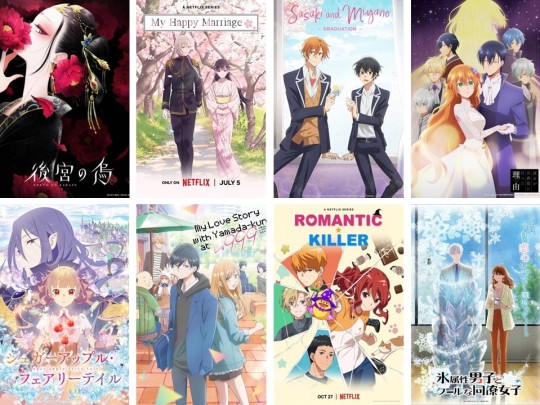
#shoujo anime#shojosei#josei anime#shoujo#anime#kōkyū no karasu#kokyuu no karasu#raven of the inner palace#my happy marriage#watashi no shiawase na kekkon#romance anime#sasaki to miyano#sasaki and miyano#why raeliana ended up at the duke's mansion#kanojo ga koushaku tei ni itta riyuu#sugar apple fairy tale#my love story with yamada kun at lv999#yamada kun to lv999 no koi wo suru#romantic killer#the ice guy and his cool female colleague#koori zokusei danshi to cool na douryou joshi
175 notes
·
View notes
Text
(IDOLiSH7) Aoku (蒼く) - Haruka Isumi & Torao Mido [English Translation]

Link to my Twitter post with the color-coded lyrics
Lyrics:
始まりはいつでも突然だけど Hajimari wa itsudemo totsuzen dakedo The beginning is always abrupt, but
新しい季節には胸が躍る Atarashii kisetsu ni wa mune ga odoru My heart flutters with the arrival of a new season
待ち侘びていたのかぼくはまるで Machiwabiteita no ka boku wa marude Had I been waiting for it all this time?
水を得たように呼吸をしていた Mizu o eta you ni kokyuu o shite ita I was breathing like a fish that’s found water
(あてもなく) ゆらゆらと (Atemo naku) Yurayura to (Aimlessly) Swaying, gently
(とめどなく) 漂って (Tomedo naku) Tadayotte (Endlessly) Drifting along
(目を開ければ) 辿り着く紺碧の空 (Me o akereba) Tadoritsuku konpeki no sora (When I open my eyes) I’ll reach the deep blue sky
希望とか夢とか知らないけど Kibou to ka yume to ka shiranai kedo I’m not sure about my hopes or dreams,
未来がもしあるのなら今 Mirai ga moshi aru no nara ima But if there really is a future, it’s now
蒼く染まれ突き抜けるまで Aoku somare tsukinukeru made Get dyed in blue, until you break through
独りきりの夜を裂いて Hitorikiri no yoru o saite Slicing through the solitude of the night,
果てのまだ向こうへ Hate no mada mukou e Toward what lies beyond the end
甘い毒を携えたまま握り締めた Amai doku o tazusaeta mama nigirishimeta I clutched the sweet poison I still carry tightly
ぼくの手には守るべき世界が今はあるから Boku no te ni wa mamoru beki sekai ga ima wa arukara In my hands, I now have a world I must protect
浮かんでは消えゆく光の中 Ukande wa kieyuku hikari no naka Amidst lights that emerge and fade,
捕まえた言葉たち胸に宿る Tsukamaeta kotobatachi mune ni yadoru The words I caught now dwell in my heart
忘れないでいたのか Wasurenai de ita no ka Had I managed to not forget them?
それともただ忘れられずにここまで来たのか Soretomo tada wasurerarezu ni koko made kita no ka Or did I simply make it this far, unable to forget them?
蒼く染まれ突き抜けるまで Aoku somare tsukinukeru made Get dyed in blue, until you break through
振り返ってる暇はないぜ Furikaetteru hima wa naize There’s no time to look back now
時はただ彼方へ Toki wa tada kanata e Time just keeps moving onward
甘い毒に蝕まれてた遠い夢に Amai doku ni mushibamareteta toui yume ni The distant dreams that were tainted by the sweet poison —
別れ告げて新しいメロディーをきみと歌うから Wakare tsugete atarashii merodii o kimi to utau kara I’ll bid them farewell, and sing a new melody with you
聴こえるかどこまでも響き合う Kikoeru ka doko made mo hibiki au Can you hear it? It resonates endlessly
(ただ自由に) ゆらゆらと (Tada jiyuu ni) Yurayura to (Just freely) Swaying, gently
(ただ自由に) 漂って (Tada jiyuu ni) Tadayotte (Just freely) Drifting along
(目を開ければ) 辿り着いた紺碧の空 (Me o akereba) Tadoritsuita konpeki no sora (When I opened my eyes) I had reached the deep blue sky
(そのブルーの) 真ん中で (Sono buruu no) Mannaka de (In that blue) Right in the center
(ただブルーに) 溶けるように (Tada buruu ni) tokeru you ni (Just in the blue) As if melting into it
(目を閉じても) 消えないだろう (Me o tojitemo) Kienai darou (Even if I close my eyes) I’m sure it won’t disappear
希望とか夢とか要らないのさ Kibou to ka yume to ka iranaino sa I don’t need any hopes or dreams,
目の前に広がるのはああ Me no mae ni hirogaru no wa aa What unfolds before my eyes is, ah
蒼く染まれ突き抜けるまで Aoku somare tsukinukeru made Get dyed in blue, until you break through
独りきりの夜を裂いて Hitorikiri no yoru o saite Slicing through the solitude of the night,
果てのまだ向こうへ Hate no mada mukou e Toward what lies beyond the end
甘い毒を味方に付けたぼくの声は Amai doku o mikata ni tsuketa boku no koe wa My voice, now united with the sweet poison,
きみと混ざり明日へと響く Kimi to mazari ashita e to hibiku Merges with yours and echoes into tomorrow
蒼く染まれ突き抜けるまで Aoku somare tsukinukeru made Get dyed in blue, until you break through
辿り着いたぼくの手には Tadoritsuita boku no te ni wa In my hands, at the end of my journey,
守るべき世界ときみが居るから Mamoru beki sekai to kimi ga iru kara I have a world I must protect, as well as you
#idolish7 translation#zool#idolish7#ainana#i7#id7#i7 translation#torao mido#mido torao#torao midou#midou torao#haruka isumi#isumi haruka#16producers#16 producers
27 notes
·
View notes
Text

Kusuriya no Hitorigoto ~Maomao no Kokyuu Nozotoki Techou~ Vol.19 (Special Edition)
#kusuriya no hitorigoto#the apothecary diaries#natsu hyuuga#minoji kurata#touco shino#shogakukan#manga
20 notes
·
View notes
Text
Musou (Español)

Intérprete: Mikaze Ai (CV. Aoi Shouta)
Album: QUARTET NIGHT SOLO BEST ALBUM Mikaze Ai “Ambivalent”
Fecha de lanzamiento: 7 agosto 2024
夢奏-むそう- Musou Tocando la música que soñamos
零れないで 零さないで Koborenaide kobosanaide No lo desperdicies, no lo dejes ir
たった一瞬 だけど永遠だと信じているから Tatta isshun dakedo eien da to shinjite iru kara Porque aunque sólo es un momento, yo creo que es eterno
奏 Let's keep singing Kanade let’s keep singing Toquemos y continuemos cantando
つま先まで痺れさせる 歓喜に似た衝動は Tsumasaki made shibiresaseru kanki ni nita shoudou wa El impulso similar a la alegría que me recorre hasta los dedos de los pies
(Tell me what you call it. I can see it shining through.) (Dime cómo lo llamas. Puedo verlo brillar a través de mí)
全身 まばゆいほど千々に乱れ呼吸だけが耳に返る Zenshin mabayui hodo chiji ni midare kokyuu dake ga mimi ni kaearu Es muy deslumbrante y vuelve mi cuerpo tan caótico que lo único que puedo escuchar es mi respiración
(Tell me what you call it. Realize what it means to exist.) (Dime cómo lo llamas. Date cuenta de lo que significa existir)
Maybe Quizás
剥がれ落ちてゆく(ボクのカタチが) Hagare ochite yuku (boku no katachi ga) Aunque me esté desbaratando (la forma que tengo)
不完全だとしても(一つじゃないと) Fukazenda to shite mo (hitotsu ja nai to) O sea imperfecto, (no será la misma)
求めるだけじゃ終わらせない本物を Motomeru dake ja owarasenai honmono o No terminaré sólo deseando, estoy buscando lo real
You know that's me Sabes que este soy yo
(果てない夢へ) (Hate nai yume e) (Hacia un sueño sin fin)
色も記号もない世界に増えてゆくものが Iro mo kigou mo nai sekai ni fuete yuku mono ga Las cosas que van aumentando en este mundo sin colores ni símbolos
自分だけの証なんだと Jibun dake no akashisanda to Son prueba de mi propia existencia
(とめどないアップデート) (Tomedonai appudeeto) (Actualizaciones interminables)
作り上げてきた曲たちが導(しるべ)になり Tsukuriagetekita kyoku tachi ga shirube ni nari Las canciones que he creado se han convertido en la guía
君のもとへ Get there Kimi no moto e get there Con la que he llegado a ti
涙の跡残すよりも 喜びへと輝かせる Namida no ato nokosu yori mo yorokobi e to kagayakaseru Más que dejar rastros de lágrimas, deja que esa fuerza
そんな(強さいつも) Sonna (tsuyosa itsumo) Brille siempre con alegría
予測だけじゃ足りないもの ためらいなく受け入れれば Yosoku dake ja tarinai mono tamerai naku ukeirereba Si acepto sin dudar las predicciones que por sí solas no son suficientes,
(I can believe it now. I can see it shining through.) (Ahora puedo creer en ello. Puedo verlo brillar a través de mí)
消えない 希望への渇望 Kienai kibou e no katsubou Mi deseo de esperanza nunca desaparecerá
(果てない夢へ) (Hate nai yume e) (Hacia un sueño sin fin)
自分の手で生み出してゆくこの世界には Jibun no te de umidashite yuku kono sekai ni wa En este mundo que estoy creando con mis propias manos
必要で不可欠なもの Hitsuyou de fukaketsuna mono Hay cosas necesarias e indispensables
(手離せはしない) (Te hanase wa shinai) (No te dejaré ir )
君がいるからこそ この夢 叶えられる Kimi ga iru kara koso kono yume kanaerareru Gracias a que estás aquí pude lograr este sueño
突き動かす My wish Tsuki ugokasu my wish Conducido por mi deseo
ここに立っている(それが真実) Koko ni tatte iru (sore ga shinjitsu) Estoy aquí (esa es la verdad)
ボクがボクであるって(それが真実) Boku ga boku de arutte (sore ga shinjitsu) Y yo soy yo (esa es la verdad)
揺るがない想いが限りなく紡ぐ夢 Yuruganai omoi ga kagirinaku tsumugu yume Los sentimientos inquebrantables tejerán sueños infinitamente
愛して Aishite Amame
(果てない夢へ) (Hate nai yume e) (Hacia un sueño sin fin)
色も記号もない世界に増えてゆくものが Iro mo kigou mo nai sekai ni fuete yuku mono ga Las cosas que van aumentando en este mundo sin colores ni símbolos
自分だけの証なんだと Jibun dake no akashisanda to Son prueba de mi propia existencia
(とめどないアップデート) (Tomedonai appudeeto) (Actualizaciones interminables)
作り上げてきた曲たちが導(しるべ)になり Tsukuriagete kita kyoku tachi ga shirube ni nari Las canciones que he creado se han convertido en la guía
君のもとへ Get there Kimi no moto e get there Con la que he llegado a ti
矛盾でさえも Mujun de sae mo Incluso las contradicciones
(果てない夢へ) (Hate nai yume e) (Hacia un sueño sin fin)
美しく鮮やかに Utsukushiku azayaka ni Son hermosas y vívidas
I for you
Si te gusta mi trabajo, considera apoyarme en ko-fi nwn PV Apoya comprando el original
10 notes
·
View notes